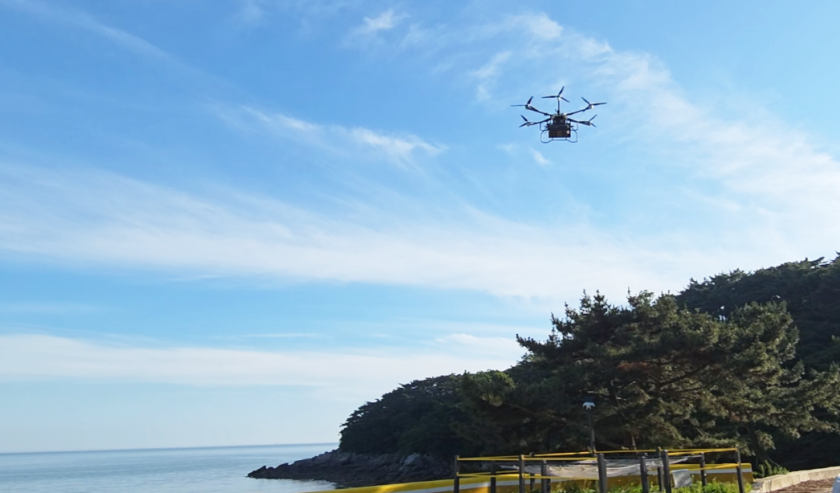The Republic of Korea’s Ministry of Land, Infrastructure and Transport (MOLIT) announced today, July 1, that it will significantly expand the K-Drone Delivery implementation area from 50 areas last year to 166 areas this year.
Launched in 2024, K-Drone Delivery is Korea’s drone delivery system that operates by pre-establishing drone flight paths, drone delivery bases and real-time drone situation management systems in accordance with MOLIT guidelines.
Last year, 14 local governments implemented drone deliveries of 10,635 km and 2,993 times in 50 areas (32 islands, 17 parks, and 1 port). This year, 23 local governments are already participating in K-Drone Delivery, delivering items such as food and parcels by drone in 44 islands and 122 parks. Expansion will continue nationwide throughout the year, with particular focus on the implementation of drone public services to ensure the safety of island residents.
After implementing drone delivery in Sanghwado, Hwado, and Jedo in Yeosu City, drone coastal patrols in nearby dangerous areas will be conducted in cooperation with the Coast Guard. Drone safety patrols will then begin at Jinha Beach in Seosaeng District, Ulju County in the second half of the year.
Meanwhile, in Godeodo, Janggodo and Sapsido in Boryeong City, expired medicines will be collected and transported to Wonsando by drone before being handed over to the public health centre.
Incheon Metropolitan City plans to collect marine waste by drone on the beach near Deokjeokdo and is implementing a drone monitoring service to prevent accidents such as catching fish and shellfish by hand on the shore in the tidal flats near Muuido and Yeongheungdo. This drone monitoring service has already contributed to the safety of island residents, with four people being rescued this year.
In Gapado, Jeju Island, sea urchin roe collected by divers will be delivered on the same day as collection by drone until mid-July, limited to the Jeju area. Up to 5kg per day, limited to the first 10 people, will be delivered back to the Sangmori drone delivery base, and in Biyangdo, clams, squid, and elephant clams caught by residents will be delivered back to the Geumneung Ferry Terminal drone delivery base.
Drone delivery is also actively being implemented in urban parks and tourist destinations. Seongnam City plans to implement drone delivery from the Geumgok Park water park, Gumi-dong dog park-barefoot Hwangttotgil-water park along Tancheon during July and August, and from the Central Park starting in September.
Ulju-gun delivers food to Ganwoljae (reed field) located 900m above sea level, and delivers food and other items by drone to a total of 15 delivery points, including Jakcheonjeong Starlight Campground, Seosaeng Daebawi Park, and Solgae Park.
A new demonstration regarding drone delivery of medical supplies, such as blood samples in urban areas, will also be conducted. Daejeon Metropolitan City is scheduled to begin a service where blood samples will be quickly transported by drone over a long distance (over 15 km) between the Armed Forces Daejeon Hospital and the Red Cross Daejeon Blood Center, and the K-drone delivery system will be applied as a pilot project for military emergency medical services.
Joo Jong-wan, Director of MOLIT’s Aviation Policy Bureau, said the K-Drone programme will continue to expand nationwide and that the ministry will actively support the introduction of the tidal flat drone monitoring service to other local governments. In addition, the government plans to further strengthen drone delivery safety management by mandating pre-flight risk assessments and aircraft condition system checks, and strengthen safety inspections of drone delivery companies through the Korea Transportation Safety Authority.
The K-Drone expansion plan announcement follows MOLIT’s launch of a nationwide contest to evaluate drone manufacturers and operators.
For more information
Ministry of Land, Infrastructure and Transport
Image: MOLIT




